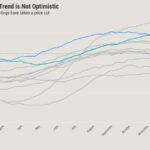A reverse mortgage loan has “first-priority” status in a Pennsylvania foreclosure dispute, after initially being rejected by the trial court according to court documents reviewed by HousingWire’s Reverse Mortgage Daily (RMD), and an analysis by attorneys at law firm Wilentz, Goldman & Spitzer, P.A.
In 2005, the client purchased a home in the Foxfield at Naaman’s Creek community in Garnet Valley, Penn. with a traditional mortgage. In 2011, the owner obtained a reverse mortgage on the property from Bank of America, where the bank paid off the original mortgage before the loan was ultimately sold, landing in the hands of Reverse Mortgage Funding (RMF). Starting in 2015, the homeowner fell behind on certain fees and assessments, leading to the association to declare a foreclosure action.
The final decision was handed down by Pennsylvania Superior Court Judge Deborah Kunselman.
“The Association sent notice of the impending sale to multiple entities, including Bank of America, [The U.S. Department of Housing and Urban Development (HUD)], and Reverse Mortgaging Service Department, the mortgage servicer. The Association did not send notice to RMF,” the judge’s order reads. In May 2022, the property was sold at a foreclosure auction and at the time of sale, “the sheriff did not indicate to prospective purchasers that the property was being sold subject to any mortgage,” the order reads. “RMF did not attend the sale to purchase the property.”
But RMF’s lien on the property was not divested by the sale, but the association asked the initial trial court to indicate that RMF’s lien was divested by the sale. RMF “maintained that its mortgage was a senior lien and should not be divested,” but the trial court found that the association’s lien had priority over RMF’s lien.
RMF requested a review of the decision but the trial court maintained its original verdict, leading RMF to appeal to the state’s superior court. The judge ultimately sided with RMF, finding that its lien held senior priority over the “original mortgage,” which the judge characterized as a novel legal question.
“In Pennsylvania, liens generally are prioritized based on the order in which they are recorded,” the judge wrote. “However, under certain circumstances, a statutory lien […] may affect this general rule.”
Since there is a section in the law cited by the HOA that “establishes a lien for an association for unpaid assessments or fines,” statutory authority goes to such a lien in most cases, and the court must define what “first mortgage” means in this instance since the relevant law does not.
The judge cited the definition of “first mortgage” in Black’s Law Dictionary, which calls it a “mortgage that has priority over another mortgage (a junior mortgage) on the same property.”
“The association and the trial court suggest that we should look at the entire history of the property,” the judge wrote. “RMF maintains that we must look only at the record existing at the time of the sale. We agree with RMF.”
The judge summed up the ruling by siding with RMF.
“In sum, we conclude that the trial court misinterpreted the meaning of ‘first mortgage’ and erred when it granted the association’s exceptions and ordered that RMF’s mortgage was divested,” the ruling said. “We, therefore, reverse the court’s order granting the association’s exceptions to the sheriff’s schedule of distribution and direct that RMF’s mortgage be reinstated.”
An analysis by the law firm also detailed some of the other realities established by the decision.
“[The] RMF mortgage discharged the original mortgage and was the first mortgage lien at the time of the sale,” the analysis said. “The Superior Court therefore reversed the trial court and reinstated RMF’s first mortgage lien.”
HECM loans require borrowers to continue paying property taxes, homeowner’s insurance and — if applicable — HOA fees to keep their loan in good standing. Failure to do so could result in an acceleration of the loan to “due and payable” status.
RMF went bankrupt in late 2022, and soon after a liquidity crisis engulfed the reverse mortgage industry. The company only exists now as an estate for its financial affairs, since the reverse mortgage lending operations effectively ended in late 2022 with the seizure of its Home Equity Conversion Mortgage (HECM)-backed Securities (HMBS) portfolio by Ginnie Mae.




